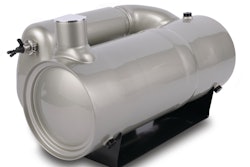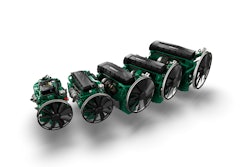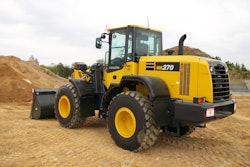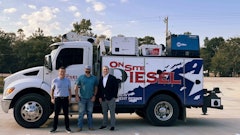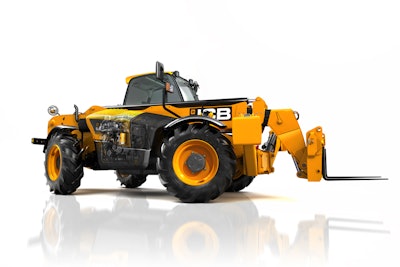
JCB, the world’s number one telescopic handler manufacturer, has used the introduction of its high torque, low emission Ecomax diesel engines to look at every aspect of its Loadall range performance, with the adoption of high back-off brakes, transmission dump on the brake pedal and variable speed cooling fans among the changes.
Developed to meet the EU Stage IIIB/US Tier 4 Interim (Tier 4i) emissions standards, the JCB Ecomax Tier 4i engine has no requirement for costly diesel particulate filters (DPFs) or for exhaust aftertreatment fluids, resulting in low cost, efficient operation for customers.
Loadalls powered by the JCB Ecomax engine are now in production and revisions to the line-up include:
- JCB Ecomax engines offering up to 7% improved fuel economy and 15% more torque
- High back-off brakes on 531-70, 541-70, 535-95 and 533-105 models
- Reduced transmission oil levels
- Variable speed cooling fan on most powerful models
- New aggressive styling with revised engine canopy and pod
- Modern cab environment for reduced fatigue and enhanced ease of use
“JCB has focused on the complete Loadall design, which is engineered specifically to work in construction and agriculture. That includes more than 110,000 hours of engine testing and an investment of more than £80 million to deliver the most efficient range of engines for our customers,” says Tim Burnhope, Chief Innovation and Growth Officer.
Clean Efficient Power With Reduced Consumption
JCB’s Ecomax diesel engines incorporate an advanced combustion system (patent pending) that manages emissions within the engine, rather than having to rely on expensive aftertreatment or a DPF. Through the use of cooled exhaust gas recirculation (EGR), a high pressure common rail injection system using up to 2,000 bar injection pressures and a variable geometry turbocharger,
JCB Power Systems has been able to meet the emissions standards while developing additional power and torque, yet using less fuel.
There are three engine ratings available to construction Loadall customers. A 74 hp (55 kW) engine is standard on the 531-70, 541-70, 535-95, 533-105, 535V-125, 535V-140 and the 540-140. A 108 hp (81 kW) engine is standard specification for the 531-70, 541-70WM and the 540-170, while a range-topping 125 hp (93 kW) engine is included as standard in the 550-80WM and 550-80 models. Customers can also opt for the 108 hp (81 kW) engine in the majority of the Loadall models as an option, while the 125 hp (93 kW) motor is available as an option in four of the larger models.
The 74 hp (55 kW) engine is expected to prove particularly popular with the plant hire market. Though delivering slightly less outright power than the engine it replaces, the Ecomax engine produces 6% more torque and 5% more power at low revs than the previous Tier 3 engine. This means that operators get the same performance, though owners will see increased efficiency and improved fuel consumption. Based on annual operation of 1,000 hours, a new generation Loadall using a 55 kW engine, will use up to 7% less fuel, saving customers up to 1,890 liters of fuel or £1,361 over the first three years of use.
The 108 hp (81 kW) engine is expected to appeal more to owner operators and contractors, for whom the 15% increase in torque and 10% boost to low rev power will prove a valuable gain in high production duties. A variable speed cooling fan is standard on the two more powerful engines, reducing fuel consumption, while allowing faster warm-up for more efficient engine running in colder weather.
Drivetrain Improvements Boost Productivity
In addition high back-off brakes, which literally pull the brake pads away from the disc to prevent drag, will be incorporated on the 531-70, 541-70, 535-95 and the 533-105.
Already standard on the 550-80, high back-off brakes contribute a 2% efficiency gain to the driveline. This is further improved by reduced transmission oil levels, cutting churning losses and drag within the transmission. The PS750 Powershift gearbox now uses one litre less of oil, while the PS764 saves 1.5 liters of oil. This reduction in drag contributes a further 1% efficiency gain.
Bold Exterior Design Preserves JCB Visibility And Serviceability
A revised engine cover and pod now direct cooling air from the top of the front canopy, around the engine and through the cooling pack, to exit through new vents at the top of the rear of the canopy. This prevents cooling air disturbing dust and debris on the ground below the engine, prolonging air filter life and reducing dust on site for the operator.
However, despite the aggressive new look, complete with updated JCB color scheme, the designers have not had to sacrifice JCB’s legendary visibility across the engine. As there is no bulky DPF or exhaust after treatment to accommodate beneath the engine canopy there has also been no requirement to extend the wheelbase or chassis length of the Loadall, as with some competitors, so the machines also maintain their respected manoeuvrability and tight turning circles.
Improved Cab Environment For Operators
In the cab the Loadalls feature a completely new instrument cluster and dash layout, with a high resolution LCD monitor. The front dash installation has been restyled for a clearer layout and the cab heating and ventilation system now features a seven-speed fan, providing greater control for the operator. The operator’s seat now comes complete with an operator presence switch as standard, preventing the machine drive from being engaged without an operator at the controls, greatly improving site safety. The top half of the cab door now comes with a revised slam latch mechanism and door ajar facility to ensure that the window stays open if required.
“With the latest generation of construction Loadalls, JCB has once again moved the telescopic handler market forwards a giant step,” says Burnhope. “This advanced range, with clean, efficient JCB Ecomax engines, will ensure that JCB remains the world’s number one telescopic handler manufacturer.”




